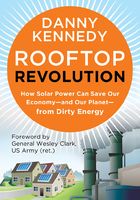
The Battle for America’s Head and Heart
There’s an epic struggle afoot for the head and the heart of America. And the fat cats in Dirty Energy who feed off our addiction to fossil fuel have an obvious motivation—profits—to keep us in denial about our bad habit. They don’t want us to dwell on our energy addiction and the damage it does to ourselves, our planet, and our children’s future. So Dirty Energy dips into its very deep pockets to tout its brand of power in the news and keep America in the dark about cleaner, smarter, more-affordable options out there. But as a growing number of Americans are finding out, they do have options.
Although change is difficult and requires traction, it’s easier when someone shines a light on the path ahead, and this is what the solar-power movement is doing: providing a solution, an alternative to business as usual, while the coal, oil, nuke, and gas giants continue their fight for the status quo. Not to be too highfalutin, but when the colonial Americans were frustrated by heavy taxation without government representation, it wasn’t until they saw a new direction—inspired by the French Republic’s demand for liberty—that forces of change pushed them to have their own revolution.
It’s time for a new revolution, an energy revolution, our revolution—a Rooftop Revolution. The movement worldwide to go solar—to usurp the powers that be in our existing electricity grids and put power in the hands of those in the developing world who don’t have it—is creating a space for as profound a change. Breaking up monopolies, spreading benefits to the poorest, making consumers producers, and getting polluters to pay and thus using market forces to get them to participate in building a clean economy—this is what the Rooftop Revolution is all about. And that’s why it’s not surprising that King CONG is fighting back.
In 2012 oil barons such as the Koch brothers will spend many millions on TV ad campaigns to tar President Barack Obama with the same brush they used on Solyndra. Those who have the most to lose, the opponents of solar, will come out with fists flying—as the US Chamber of Commerce did in the 2010 election cycle. The massive business lobby outspent the Republican and Democratic National Committees combined to further its official policy of digging up every last ounce of fuel in the ground and burning it as soon as possible.
We need to urge our politicians to refuse money from energy companies and their lobbies so that our representatives can make decisions about energy policy without being beholden to paymasters and without ignoring the public demand for clean, local energy. And public opinion is clear: according to the SCHOTT Solar Barometer, when voters were asked to select an energy source they would financially support if they were in charge of US energy policy, 39 percent said they would choose solar power while a measly 3 percent chose coal—almost the inverse ratio of our representatives in Congress.
Mark my words, we’ll have to battle a lot more of this malarkey in the near future. Case in point: the viral campaign that the American Petroleum Institute (API), the powerful oil and natural-gas trade association, launched in January 2012. Dubbed “Vote 4 Energy,” it was scripted by industry executives in a big election year to dupe viewers into believing that the tired and traditional use of dirty energy would somehow lead our country back to prosperity. Greenpeace, the environmental advocacy organization, released a parody video that exposed the reality that the API campaign wasn’t divulging—that these energy sources are damaging and unsustainable and that the jobs the corporations claim to create are only temporary. But which ads do you think more Americans see—ads funded by incredibly rich oil corporations or those of a nonprofit? The API campaign included radio, television, and print advertising in election-year swing states, including Ohio, Pennsylvania, and Virginia—fertile ground for political theater in which energy is a key issue.
As the API’s spokesman said when launching Vote 4 Energy, “It’s not about candidates, it’s not about political parties, it’s not even about political philosophy. Energy should not be a partisan issue…. We believe a vote for energy will elevate the energy conversation.” I wholeheartedly agree with the API that energy isn’t, or shouldn’t be, attached to a political party or philosophy. We know, however, that these politicized battles are not always elevated into some erudite discourse but rather end up in the gutter of half-truths and name-calling. (You know we’ve reached a new low when “Drill, baby, drill” is the apex of political rhetoric.) We know that the incumbent industries present our energy options subjectively, as the Vote 4 Energy campaign shows, and that the clean-energy industry is coming to this gunfight armed with a couple of slingshots.